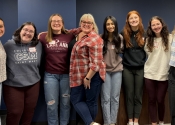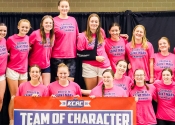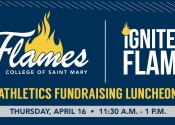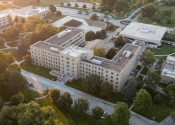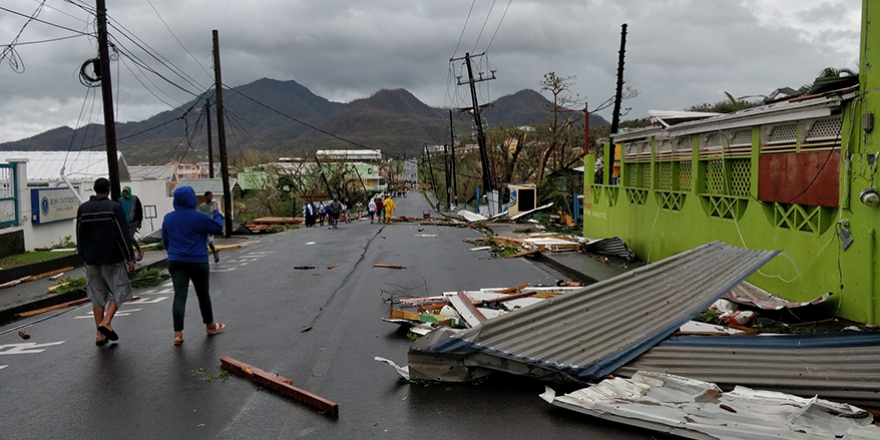
Recent College of Saint Mary graduate recounts her experience with Hurricane Maria
Nargisa “Giga” Ergasheva ‘15 Endures Dominica’s Most Destructive Storm
Just a few weeks ago, Nargisa “Giga” Ergasheva found herself on the homestretch of an intense medical program at Ross University School of Medicine. Her path to this point had been far from simple – an immigrant from Tajikistan, she had worked her way through Duchesne Academy, went on to graduate from College of Saint Mary (’15), and used her degree to jump into Creighton’s pre-med program.
Now she was at Ross University School of Medicine on the island of Dominica, on-course to becoming a doctor. However, one autumn afternoon, she was faced with perhaps the most terrifying, and certainly the most severe obstacle of her life. It came in the form of Hurricane Maria, and for Ergasheva, along with thousands of others, the devastating natural disaster halted the plans of her life in dramatic fashion.
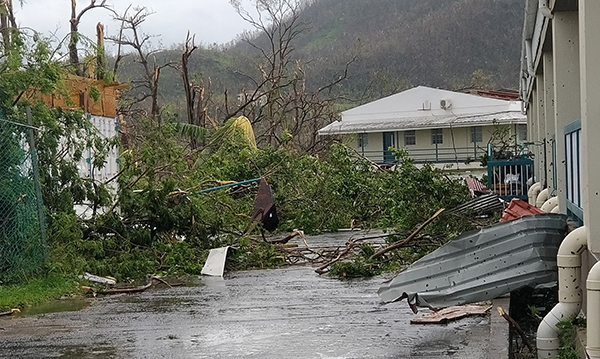
“The windows were shattering around us,” Ergasheva says, recalling moments during the storm. “Our front door flew open and we had to take turns holding it closed for hours…and you couldn’t see a thing.”
For Ergasheva, and the rest of Dominica, the storm was not a fleeting moment, but rather a daunting stretch of tension and chaos.
Anticipation for the storm began on Monday, September 18th, when Ergasheva’s classes were cancelled. She was sent home, watching the storm reach Category 1-level in the late evening. Administrators at Ross University told Ergasheva to prepare for a serious storm to hit; so, she rushed to gather food and supplies from the two small stores in town.
“We went to the stores to get the food we could,” says Ergasheva. “Where we live, there’s just two small stores and most of the [shelves] were bare.”
By 3 p.m. on Tuesday, the storm built to Category 3. It grew rapidly to a Category 5 storm – the most severe level a hurricane can reach – around 6 p.m., and sheets of rains began falling. Then, one-by-one, Ergasheva saw her resources vanish: first internet, then power and water. She was left to watch helplessly as the storm wreaked havoc.
“It sounded like we were in the middle of a constant tornado that didn’t go anywhere,” says Ergasheva. “The roofs began to leak. We spent the night in the hallway away from all windows.”
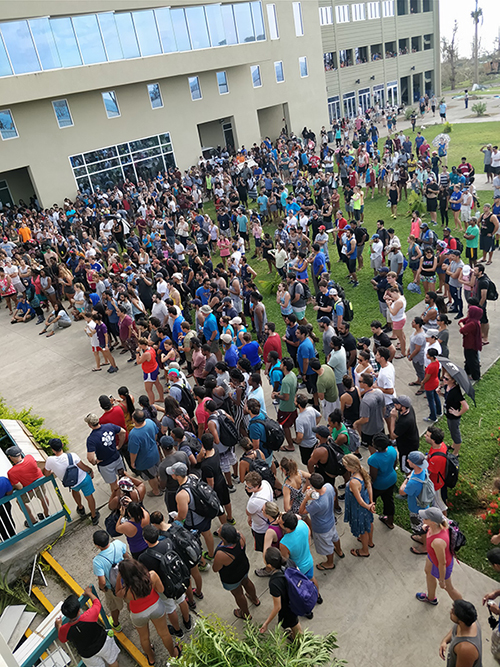
With winds reaching upwards of 200 mph, Ergasheva’s apartment was pummeled with rain and debris. As windows broke and water poured from the ceiling, she moved to the kitchen, where she waited out the storm’s fury.
“All this time you’re hearing metal clinging outside. Sounded like cars being thrown around,” she says. “It was pitch dark—the wind was the only thing you could see. It appeared white, like something out of a cartoon.”
In the late evening the next day, nearly 48 hours later, she heard voices outside. It was then that she emerged to survey the damage. Ergasheva’s apartment was built to withstand a Category 4 storm, although most people in the area lived within much flimsier homes. The result throughout the area was utter devastation. Nearly 90 percent of the country’s homes were destroyed. Roads were blocked, power was out, there was no running water, and the usually lush trees were stripped to barren skeletons.
Upon the recommendation of Ross University administrators, Ergasheva and her classmates took refuge on campus, where they could stay in more in-tact quarters safe from looters. Although the space was more secure than much of the surrounding area, living conditions were still bleak.
“We all packed into study rooms and slept on the floor – 11-12 people per room,” says Ergasheva. “People were sleeping in hallways. Still no water, so people had to use the bathroom in bags. It was extremely hot and unsanitary. We lived off ramen noodles for about a week.”
Despite her own tumultuous circumstances, Ergasheva says she was one of the lucky residents of Dominica, and her school came to the rescue. Ross University hired a private company to help with evacuations and lifted Ergasheva and other students to safety – free of any charges. She was given food and water in St. Lucia, and flown to Omaha, where she was reunited with anxious family members. Still, even during her own rescue, her thoughts raced back to the needs of the less fortunate.
“It’s bittersweet,” she says. “We were so scared and anxious to get off of that island. But then you see all the people you’re leaving behind. That’s their home, and it’s now destroyed.”
It has been estimated that Dominica will take years to rebuild. Regardless, Ergasheva plans to pursue her dreams, and remains grateful for the care she received.
“I’m thankful for the people of Dominica for taking us into their homes and for Ross University for their care and support during the evacuation process,” she says. “We owe our lives to those people.”
It’s this concern for the wellbeing of others that brought Ergasheva to the island in the first place. As a child, she watched her mother, who had immigrated to the states, struggle with a range of medical issues. She didn’t have insurance, and the bills were quickly becoming insurmountable for the family. Ergasheva turned to a high school friend who owned a nearby clinic and was able to treat her mother free of charge. She says the hospitality of the clinician saved her mother’s life and motivated Ergasheva to become a doctor.
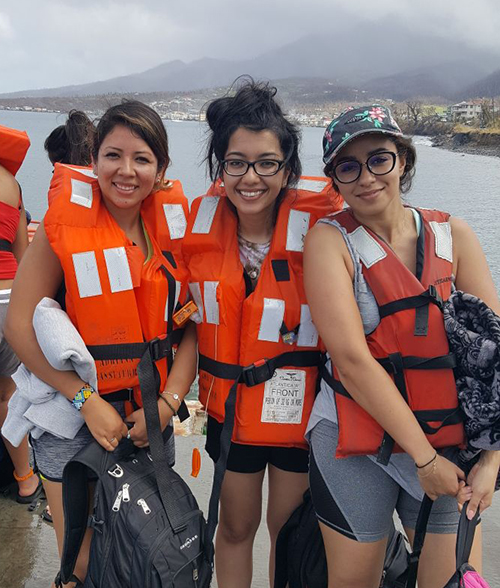
“I don’t want people going through the worries and fears that result from high medical costs, especially loved ones,” she says. “My ultimate goal is to provide care to people who can’t afford it.”
At College of Saint Mary, Ergasheva’s plans were solidified through classroom experience, an inclusive campus, and interactive internships. An active on-campus resident for all four years, she was a president of the Green Team environmental group and a member of the Math & Science Club. In 2014-15, she unearthed a passion for servant leadership as she interned with a physician at University of Nebraska Medical Center (UNMC). While there she worked with patients with Sjogren Larsson Syndrome and worked on a new medication and cure.
Now, she plans to carry the values of College of Saint Mary – promoting a spirit of mercy and servant leadership – into the community.
“I want to specialize in OBGYN, because of the things my mother went through,” says Ergasheva. “I want to focus on women’s health care especially.”
Even in the face of the disastrous aftermath of the hurricane, Ergasheva has remained positive and ready for the next step. After spending a couple weeks at home with family, Ergasheva was recently transported to St. Kitts where her and fellow med students will continue to study medicine on a cruise ship docked near the port.
Although the full ramifications of the storm are not clear, academic timelines and graduation are likely to be pushed back. At least for the moment, this “Floating University” is what Ergavesha and many others now call home.
Photo 1: With winds reaching upwards of 200 mph, nearly 90 percent of homes in Dominica were destroyed. (photo by Ali Hachem)
Photo 2: Students gather at Ross University after the hurricane. (photo by Ali Hachem)
Photo 3: Nargisa "Giga" Ergasheva (middle) with fellow classmates on a boat headed to St. Lucia for evacuation






